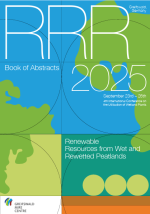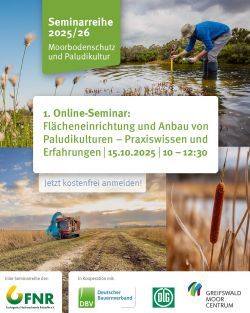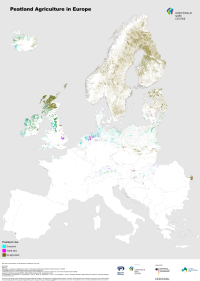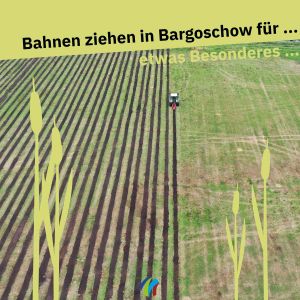News
2025
Book of Abstract ready
by Berit Krondorf (comments: 0)
Get the full picture of RRR2025

20/09/2025 Here ready to be browsed: our Book of Abstract of the 4th international conference on “Renewable Resources from Wet and Rewetted Peatland - RRR2025. Apart from an overview of the programme and practical information it gives you full descriptions of key notes, excursions, sessions and workshops.
Paludiculture in series
by Berit Krondorf (comments: 0)
Four free seminars

10/09/2025 Register now for four seminar series ‘Peatland protection and paludiculture’ – online, free of charge and jointly organised by FNR e.V., DBV e.V., DLG e.V. and GMC.
The first seminar on 15 October 2025 will take place from 10:00 a.m. to 12:30 p.m. and focus on ‘Land preparation and cultivation of paludiculture’.
It will cover the following topics:
- Approval procedures and obstacles
- Planning, implementation and cultivation in practice
- Communication as the key to successful projects
further topics and speakers are:
• From knowledge to change – preserving moorland soils through structured cooperation
Katja Searles – Speaker, Brandenburg State Office for the Environment
• Tasks and obstacles in the approval process
Kerstin Norda – Managing Director, Nature Conservation Foundation of the District of Cuxhaven
• Practical challenges: planning, implementation and cultivation
Anke Nordt – Project Manager PaludiMV, Landgesellschaft Mecklenburg-Vorpommern
Click here to register.
MoorMic on Air
by Nina Körner (comments: 0)
Peatland sound live & recorded
2/09/2025 MoorMic/KoosMic – the microphone for the sound of the landscape directly from the coastal peatland – for everyone to listen to! KoosMic, because this new listening station is located on the island of Koos just outside Greifswald. From there, it transmits live and in recorded soundscapes of the surrounding habitats, the sounds of peatland meadows, pastures, and hedges. Wind in the reeds, rain on the shore, cows snorting, cranes calling – depending on the weather and season.
The MoorMic/KoosMic is part of the global acoustic cartography radio.aporee by media artist Udo Noll. He worked on it together with students of “Acoustic Ecologies and Sound Studies” at the Bauhaus University Weimar and their professor Kerstin Ergenzinger. Unobtrusive, virtually maintenance-free, solar-powered, and installed with minimal impact on the landscape – the group has successfully implemented its criteria for the MoorMic/KoosMic. The MoorMic has been transmitting since early summer. It has only had to be moved once so far. Cows had been sniffing at it too wildly.
The listening station is intended to promote awareness and perception of the environment. In line with the interdisciplinary research of “acoustic ecology,” it enables the condition and changes in landscapes to be recorded via sound. It is also about sharing and documenting the sound of the world. Almost everyone captures their world in pictures and videos, but what about sound snippets?
The island sound of the marshy coast of Greifswald Bay is available thanks to MoorMic/KoosMic – from anywhere, anytime, and for everyone. For a listening session, simply tune in at radio.aporee.org:8443/koosmic.
Agriculture on Europe's peatlands?
by Nina Körner (comments: 0)
New map shows where

1/09/2025 Across Europe many wetlands are drained for agriculture, releasing vast amounts of CO₂ into the atmosphere. Identifying where these drainage “hot spots” occur—whether for arable crops or grassland—is critical to promoting wet alternatives such as paludiculture. As part of the project Building the European Peatlands Initiative: A Strong Alliance for Peatland Climate Protection in Europe, researchers have combined the latest European Wetland Map with land cover data to produce a new map showing the agricultural use of peatlands in the European Union and several neighboring countries (Verlinkung von GMC). This map offers valuable insights for policymakers, conservationists, and the interested public seeking sustainable solutions. The map is based on data from the Global Peatland Database (GPD), which collates and integrates data on location, extent and drainage status of peatlands and organic soils worldwide and for 268 individual countries and regions.
The project is part of the European Climate Initiative (EUKI), funded by the German Federal Ministry for Economic Affairs and Climate Action (BMWK) and implemented by the Deutsche Gesellschaft für Internationale Zusammenarbeit (GIZ) GmbH. Project partners include Eurosite, CEEweb and the European Landowners’ Organization (ELO).
The respective Geodata for the EPM 2025 can be downloaded on our website.
Pioniering for more practice
by Nina Körner (comments: 0)
in planting reed

27/08/2025 80,000 young plants have been planted in the Bargischow-Süd polder in Vorpommern since mid-July. An impressive action! As part of the Paludi-MV project, a dense, high-quality reed bed is to be created here for agricultural use. A tractor with a strip tiller has drawn long rows in the grass on the previous grassland before a soil auger prepared the planting holes, and the seedlings were transported and planted in the field using a quad. After planting, the area will be flooded. The harvest is planned for winter when the plants have lost their leaves and no birds are nesting. In the past, fodder for livestock was grown here, but due to high water levels and soil degradation, the quality was inadequate. Long-term drainage has decomposed the peat, and the polder has settled by over a meter in height. Today, it is therefore one meter below sea level. This is where the reeds come into play as an alternative! They can be used for thatched roof, plaster carriers, insulation boards or cellulose for papers and cartons. Since experience in reed cultivation is still rare, PaludiMV is examining the costs and challenges of planning and implementation.
The pilot project "Paludi-MV" is jointly implemented by the Landgesellschaft Mecklenburg-Vorpommern mbH und der Universität Greifswald , and it is funded by the Federal Ministry for the Environment . The goal is to test paludiculture on two polder areas: Bargischow-Süd (LK Vorpommern-Greifswald) and Sandhagen (LK Mecklenburg Lake District).











